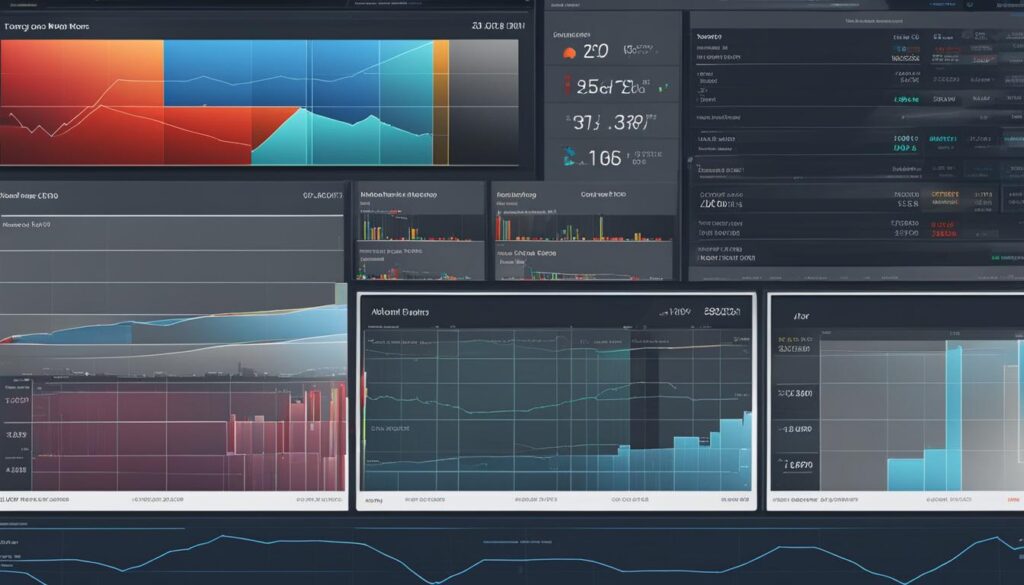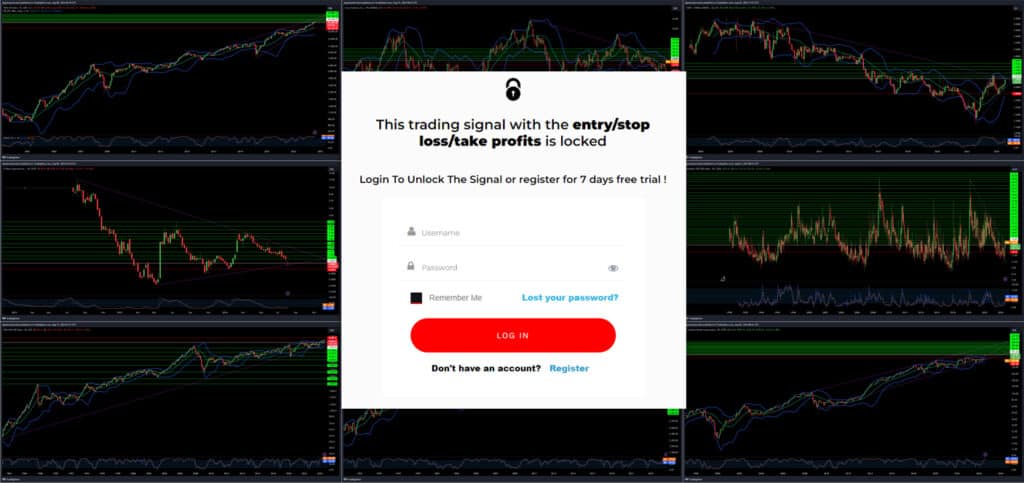As an experienced trader, I understand the challenges that come with CFD trading in volatile markets. The unpredictable and rapid changes in market prices can be both exciting and daunting. However, with the right strategies, you can navigate these volatile waters successfully and seize opportunities for profit.
Capturing the essence of market volatility, CFD trading allows you to speculate on the price movements of various underlying assets without owning them. With the use of leverage, you can magnify your potential profits and losses. But how do you make the most out of these market fluctuations?
In this article, I will share effective strategies for CFD trading in volatile markets. These strategies will help you manage risk, diversify your portfolio, analyze market trends, and choose the right trading platform and broker. By implementing these techniques, you can increase your chances of success and navigate the waves of market volatility with confidence.
Key Takeaways:
- Implement effective risk management techniques, such as setting stop-loss orders and managing position sizes, to protect your capital.
- Spread your investments across different markets, assets, or sectors to reduce risk and capitalize on various opportunities.
- Utilize technical analysis tools to identify trends, support, and resistance levels for making informed trading decisions.
- Consider fundamental analysis to evaluate the fundamental factors driving the value of underlying assets.
- Stay updated with market news and events that can cause volatility and impact the performance of your trades.
Understanding CFD Trading
Before delving into strategies, it is essential to have a solid understanding of CFD trading. CFDs, or Contracts for Difference, are financial instruments that allow traders to speculate on the price movements of various underlying assets, such as shares, commodities, indices, or currencies. What sets CFD trading apart is that traders do not actually own the assets they are trading.
With CFD trading, traders can profit from both rising and falling markets. They can take advantage of buy (long) positions to benefit from price increases or sell (short) positions to profit from price declines. This flexibility allows traders to capitalize on different market conditions.
However, one thing to keep in mind is that CFD trading involves the use of leverage. Leverage is a tool that amplifies both potential profits and losses. It allows traders to control a larger position with a smaller amount of capital. While leverage can increase potential returns, it also heightens the risks associated with trading. It is crucial for traders to understand and manage leverage effectively.
In addition to leverage, CFD trading requires maintaining a margin. Margin is a percentage of the total exposure to the trade that traders must set aside as collateral. It acts as a form of security for the broker and ensures that traders have sufficient funds to cover any potential losses. By setting aside a margin, traders can access a larger trading position than the capital they have available.
Overall, CFD trading offers a unique opportunity to speculate on the price movements of underlying assets without owning them. With the use of leverage and the requirement to maintain a margin, CFD trading allows traders to enter positions larger than their capital. However, it is crucial to manage leverage effectively and understand the risks involved to trade CFDs successfully.
“CFDs allow traders to speculate on the price movements of various underlying assets without owning them.”
Strategies for CFD Trading in Volatile Markets
Successful CFD trading in volatile markets requires implementing effective strategies that mitigate risks and capitalize on opportunities. Here are key strategies to consider:
- Risk management: Implement proper risk management techniques, such as setting stop-loss orders and establishing appropriate position sizes to manage exposure. Stop-loss orders act as a safety net, automatically closing a trade when the price reaches a predetermined level, thereby limiting potential losses.
- Diversification: Spread investments across various markets, assets, or sectors to reduce risk. Diversifying your portfolio allows you to capture different opportunities and avoid over-exposure to any single asset or market.
- Technical analysis: Utilize technical analysis tools and techniques to identify trends, support and resistance levels, and make informed trading decisions. Analyzing charts, indicators, and patterns can provide insights into future price movements.
- Fundamental analysis: Assess the fundamental factors that drive the value of underlying assets. Consider economic indicators, company financials, and news events that may impact the performance of the assets you are trading.
- Stay updated: Stay informed about market news and events that can cause volatility. Keeping abreast of market developments allows you to react quickly and make well-informed trading decisions.
| Strategy | Description |
|---|---|
| Risk management | Implement proper risk management techniques: |
| – Set stop-loss orders to limit potential losses | |
| – Establish appropriate position sizes to manage exposure | |
| Diversification | Spread investments across various markets, assets, or sectors to reduce risk and maximize opportunities |
| Technical analysis | Use charts, indicators, and patterns to identify trends, support and resistance levels, and make informed trading decisions |
| Fundamental analysis | Assess the fundamental factors that drive the value of underlying assets, such as economic indicators, company financials, and news events |
| Stay updated | Stay informed about market news and events that can cause volatility and impact asset performance |
By combining these strategies, traders can navigate volatile markets more confidently and increase their chances of success in CFD trading.
Choosing the Right CFD Trading Platform and Broker
Selecting the right CFD trading platform and broker is crucial for success in your CFD trading journey. To make an informed decision, consider the following important factors:
1. Regulations
It is essential to ensure that the CFD trading platform and broker you choose are regulated by reputable authorities. This step is crucial as it helps protect your funds and ensures fair trading practices. Conduct thorough research to verify the regulatory compliance of the platform and broker before proceeding with any transactions.
2. Fees
Compare the fees charged by different CFD trading platforms and brokers to find a cost-effective option. Consider aspects such as spreads, commissions, overnight charges, and withdrawal fees. By carefully evaluating the fees, you can optimize your trading costs and maximize profitability.
3. Customer Support
Access to responsive and reliable customer support is essential when choosing a CFD trading platform and broker. Look for platforms and brokers that offer round-the-clock support to address any issues or concerns you may have. Excellent customer support ensures that you receive prompt assistance whenever you need it, enhancing your overall trading experience.
4. Trading Tools
A comprehensive range of advanced trading tools can significantly enhance your CFD trading experience. Look for platforms that provide real-time charts, technical indicators, and risk management features. These tools can offer valuable insights, assist in making informed trading decisions, and help you effectively manage your trades to maximize profitability.
By considering these factors, you can select the most suitable CFD trading platform and broker that aligns with your trading goals and optimizes your chances of success. Remember, conducting thorough research and due diligence is vital to safeguarding your investments and achieving your financial objectives.
Conclusion
CFD trading in volatile markets requires a combination of knowledge, skills, and effective strategies. By understanding the dynamics of CFD trading, implementing risk management techniques, and selecting the right platform and broker, traders can increase their chances of success. Market volatility can be both advantageous and challenging, but with the right approach, it can be turned into a rewarding investment opportunity.
It is important to remember that trading always involves risks, and traders should only risk capital they can afford to lose. Implementing proper risk management techniques, such as setting stop-loss orders and diversifying investments, can help mitigate potential losses. Additionally, staying updated with market news and events that can cause volatility is crucial for making informed trading decisions.
Choosing the right CFD trading platform and broker is essential for a smooth trading experience. Traders should consider factors such as regulations, fees, and customer support when selecting a platform. Access to advanced trading tools, such as real-time charts and technical indicators, can also enhance the trading experience and increase the chances of successful trading outcomes.
In conclusion, despite the challenges posed by market volatility, CFD trading can offer lucrative opportunities for traders who employ successful strategies and approach the market with a disciplined mindset. By following sound risk management principles and utilizing the power of a reliable trading platform, traders can navigate the ever-changing landscape of CFD trading and strive for success.
FAQ
What is CFD trading?
CFD trading, also known as Contracts for Difference trading, allows traders to speculate on the price movements of various underlying assets without owning the assets.
What is market volatility?
Market volatility refers to the unpredictable and rapid changes in market prices, presenting both opportunities and risks for traders.
What strategies can help traders succeed in CFD trading amidst market volatility?
Effective strategies for CFD trading in volatile markets include risk management techniques, diversification, technical analysis, fundamental analysis, and staying updated with market news and events.
How do I choose the right CFD trading platform and broker?
When choosing a CFD trading platform and broker, factors to consider include regulations, fees, customer support, and available trading tools.
Is CFD trading risky?
Trading always involves risk, and traders should only risk capital they can afford to lose. However, with the right approach, CFD trading can be a rewarding investment opportunity even in volatile markets.
Disclaimer
All information on this website is of a general nature. The information is not adapted to conditions that are specific to your person or entity. The information provided can not be considered as personal, professional or legal advice or investment advice to the user.
This website and all information is intended for educational purposes only and does not give financial advice. Signal Mastermind Signals is not a service to provide legal and financial advice; any information provided here is only the personal opinion of the author (not advice or financial advice in any sense, and in the sense of any act, ordinance or law of any country) and must not be used for financial activities. Signal Mastermind Signals does not offer, operate or provide financial, brokerage, commercial or investment services and is not a financial advisor. Rather, Signal Mastermind Signals is an educational site and a platform for exchanging Forex information. Whenever information is disclosed, whether express or implied, about profit or revenue, it is not a guarantee. No method or trading system ensures that it will generate a profit, so always remember that trade can lead to a loss. Trading responsibility, whether resulting in profits or losses, is yours and you must agree not to hold Signal Mastermind Signals or other information providers that are responsible in any way whatsoever. The use of the system means that the user accepts Disclaimer and Terms of Use.
Signal Mastermind Signals is not represented as a registered investment consultant or brokerage dealer nor offers to buy or sell any of the financial instruments mentioned in the service offered.
While Signal Mastermind Signals believes that the content provided is accurate, there are no explicit or implied warranties of accuracy. The information provided is believed to be reliable; Signal Mastermind Signals does not guarantee the accuracy or completeness of the information provided. Third parties refer to Signal Mastermind Signals to provide technology and information if a third party fails, and then there is a risk that the information may be delayed or not delivered at all.
All information and comments contained on this website, including but not limited to, opinions, analyzes, news, prices, research, and general, do not constitute investment advice or an invitation to buy or sell any type of instrument. Signal Mastermind Signals assumes no responsibility for any loss or damage that may result, directly or indirectly, from the use or dependence on such information.
All information contained on this web site is a personal opinion or belief of the author. None of these data is a recommendation or financial advice in any sense, also within the meaning of any commercial act or law. Writers, publishers and affiliates of Signal Mastermind Signals are not responsible for your trading in any way.
The information and opinions contained in the site are provided for information only and for educational reasons, should never be considered as direct or indirect advice to open a trading account and / or invest money in Forex trading with any Forex company . Signal Mastermind Signals assumes no responsibility for any decisions taken by the user to create a merchant account with any of the brokers listed on this website. Anyone who decides to set up a trading account or use the services, free of charge or paid, to any of the Broker companies mentioned on this website, bears full responsibility for their actions.
Any institution that offers a service and is listed on this website, including forex brokers, financial companies and other institutions, is present only for informational purposes. All ratings, ratings, banners, reviews, or other information found for any of the above-mentioned institutions are provided in a strictly objective manner and according to the best possible reflection of the materials on the official website of the company.
Forex/CFD trading is potentially high risk and may not be suitable for all investors. The high level of leverage can work both for and against traders. Before each Forex/CFD investment, you should carefully consider your goals, past experience and risk level. The opinions and data contained on this site should not be considered as suggestions or advice for the sale or purchase of currency or other instruments. Past results do not show or guarantee future results.
Neither Signal Mastermind Signals nor its affiliates ensure the accuracy of the content provided on this Site. You explicitly agree that viewing, visiting or using this website is at your own risk.




